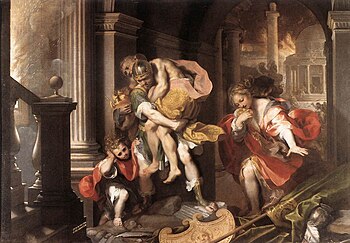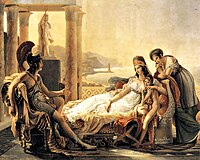Aeneas: Difference between revisions
No edit summary |
No edit summary |
||
| Line 6: | Line 6: | ||
== Legend == |
== Legend == |
||
In the ''Iliad'', Aeneas is the leader of the [[Dardan]]s (allies of the Trojans), and a principal lieutenant of [[Hector]], son of the Trojan king [[Priam]]. In the poem, Aeneas's mother [[Aphrodite]] frequently comes to his aid on the battlefield: he is also a favorite of [[Apollo]]. Even [[Poseidon]], who normally favors the Greeks, comes to Aeneas's rescue when the latter falls under the assault of [[Achilles]], noting that Aeneas, though from a junior branch of the royal family, is destined to become king of the Trojan people. |
In the ''Iliad'', Aeneas is the leader of the [[Dardan]]s (allies of the Trojans), and a principal lieutenant of [[Hector]], son of the Trojan king [[Priam]]. In the poem, Aeneas's mother [[Aphrodite]] frequently comes to his aid on the battlefield: he is also a favorite of [[Apollo]]. When [[Diomedes]] nearly kills Aeneas in battle, the latter is carried away from the ground by Venus and Apollo, who heal him at Pergamos. Even [[Poseidon]], who normally favors the Greeks, comes to Aeneas's rescue when the latter falls under the assault of [[Achilles]], noting that Aeneas, though from a junior branch of the royal family, is destined to become king of the Trojan people. |
||
When Troy was [[looting|sacked]] by the Greeks, Aeneas gathered a group, collectively known as the [[Aeneads]], traveled to [[Italy]] and became a progenitor of the [[Roman Kingdom|Romans]]. The Aeneads included his trumpeter [[Misenus]], his father [[Anchises]], his friends [[Achates]], [[Sergestus]] and [[Acmon]], the healer [[Iapyx]], his son [[Ascanius]], and their guide [[Mimas]]. He carried with him the [[Lares]] and [[Penates]], the statues of the household gods of Troy, and transplanted them to [[Italy]]. |
When Troy was [[looting|sacked]] by the Greeks, Aeneas gathered a group, collectively known as the [[Aeneads]], traveled to [[Italy]] and became a progenitor of the [[Roman Kingdom|Romans]]. The Aeneads included his trumpeter [[Misenus]], his father [[Anchises]], his friends [[Achates]], [[Sergestus]] and [[Acmon]], the healer [[Iapyx]], his son [[Ascanius]], and their guide [[Mimas]]. He carried with him the [[Lares]] and [[Penates]], the statues of the household gods of Troy, and transplanted them to [[Italy]]. |
||
Revision as of 12:09, 14 March 2006
- This article is about the Trojan warrior. For the sportsman, see Aeneas Williams.

Aeneas (Greek: Αινείας, Aineías) was a Trojan hero, the son of prince Anchises and the goddess Aphrodite (Venus in Roman sources). His father was also the cousin of King Priam of Troy. The journey of Aeneas from Troy, which led to the founding of the city that would one day become Rome, is recounted in Virgil's Aeneid. He is considered an important figure in Greek and Roman legend and history. Aeneas is a character in Homer's Iliad and Shakespeare's Troilus and Cressida.
Legend
In the Iliad, Aeneas is the leader of the Dardans (allies of the Trojans), and a principal lieutenant of Hector, son of the Trojan king Priam. In the poem, Aeneas's mother Aphrodite frequently comes to his aid on the battlefield: he is also a favorite of Apollo. When Diomedes nearly kills Aeneas in battle, the latter is carried away from the ground by Venus and Apollo, who heal him at Pergamos. Even Poseidon, who normally favors the Greeks, comes to Aeneas's rescue when the latter falls under the assault of Achilles, noting that Aeneas, though from a junior branch of the royal family, is destined to become king of the Trojan people.
When Troy was sacked by the Greeks, Aeneas gathered a group, collectively known as the Aeneads, traveled to Italy and became a progenitor of the Romans. The Aeneads included his trumpeter Misenus, his father Anchises, his friends Achates, Sergestus and Acmon, the healer Iapyx, his son Ascanius, and their guide Mimas. He carried with him the Lares and Penates, the statues of the household gods of Troy, and transplanted them to Italy.

During his journey, Aeneas and his fleet made landfall at Carthage. It is at this point that the poem of the Aeneid begins. Aeneas had a brief affair with the Carthaginian queen Elissa, also known as Dido, who proposed that the Trojans settle in her land and that she and Aeneas reign jointly over their peoples. However, the messenger god Mercury was sent by Jupiter and Venus to remind Aeneas of his journey and his purpose, thus compelling him to leave secretly and continue on his way. When Dido learned of this, she ordered a funeral pyre to be constructed for herself; and standing on it, she uttered a famous curse that forever would pit Carthage against the Trojans. She then committed suicide by stabbing herself in the chest. When Aeneas later traveled to Hades, he called to her ghost but she neither spoke or acknowledged him.
The company stopped on the island of Sicily during the course of their journey. There Aeneas was welcomed by Acestes, king of the region and son of the river Crinisus by a Dardanian woman. When the ship left, Achaemenides, one of Odysseus' crew who had been left behind, traveled with them.
Soon after arriving in Italy, Aeneas made war against the city of Falerii. Latinus, king of the Latins, welcomed Aeneas's army of exiled Trojans and let them reorganize their life in Latium. His daughter Lavinia had been promised to Turnus, king of the Rutuli, but Latinus received a prophecy that Lavinia would be betrothed to one from another land — namely, Aeneas. Latinus heeded the prophecy, and Turnus consequently declared war on Aeneas at the urging of Juno, who was aligned with King Tarchon of the Etruscans and Queen Amata of the Latins. Aeneas' forces prevailed. Turnus was killed and his people were captured. According to Livy Aeneas was victorious but Latinus died in the war. Aeneas founded the of city Lavinium, named after his wife. He later welcomed Dido's sister, Anna Perenna, who then committed suicide after learning of Lavinia's jealousy.
After his death, his mother, Aphrodite asked Zeus to make her son immortal. Zeus agreed and the river god Numicius cleansed Aeneas of all his mortal parts and Aphrodite anointed him with Ambrosia and Nectar, making him a god. Aeneas was recognized as the god Indiges. Inspired by the work of James Frazer, some have posited that Aeneas was originally a life-death-rebirth deity.
Family and legendary descendants
Aeneas had an extensive family tree. Aeneas' wet-nurse was named Caieta. He was the father of Ascanius with Creusa, and of Silvius with Lavinia. Ascanius, the son of Aeneas, also known as Iulus (or Julius), founded Alba Longa and was the first in a long series of kings.
According to the mythology outlined by Virgil in the Aeneid, Romulus and Remus were both descendants of Aeneas through their mother, and thus Aeneas was responsible for founding the Roman people. Some early sources call him their father or grandfather [1], but, considering the commonly accepted dates of the fall of Troy (1184 BC) and the founding of Rome (753 BC), this seems unlikely.
The Julian family (Gens Julia) of Rome, whose most famous member was Julius Caesar, traced their lineage to Aeneas's son Ascanius and, in turn, to the goddess Venus.
The legendary kings of Britain also trace their family through a grandson of Aeneas, Brutus.
See:list of direct descendants.
Classical sources
- Homer, Iliad II, 819-21; V, 217-575; XIII, 455-544; XX, 75-352;
- Apollodorus, Bibliotheke III, xii, 2;
- Apollodorus, Epitome III, 32-IV, 2; V, 21;
- Virgil, Aeneid;
- Ovid, Metamorphoses XIV, 581-608;
- Ovid, Heroides, VII.
- Livy, Book 1
